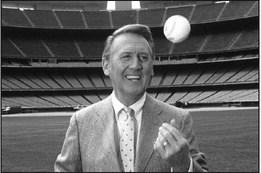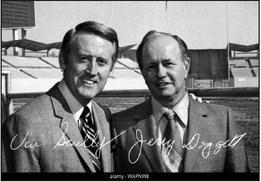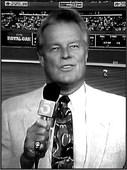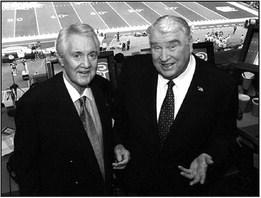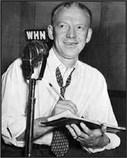Vic Scully was at top of his field
Among my early tasks as a journalist was writing obituaries. It seems as if I have reverted back to that time as far too many icons in the sports world have passed on. The latest is baseball play-byplay announcer Vin Scully. I haven’t looked, but I would guess that every list of best in Scully’s profession would have him as No. 1.
I didn’t have the opportunity, as some of my West Coast friends have, to hear him on a regular basis. Over the years, I have formed my own preferences for play-by-play guys. The top of my list has almost always been Jack Buck, longtime St. Louis Cardinals announcer. But there were others important to my life as a baseball fan. Al Helfer, longtime Mutual Game of the Day announcer; Merle Harmon, who was one of the first Kansas City Athletics’ announcers; Mel Allen, who almost always was the voice of the World Series; Waite Hoyt, the voice of the Cincinnati Reds whose games often boomed into North Central Kansas at night over radio station WLW; and of course, Dizzy Dean and Pee Wee Reese, television voices on CBS Game of the Week, were among my favorites.
But I have to agree with those who know more than I, Vin Scully was head and shoulders above the rest.
He was smooth, and had a different way of describing action on the baseball field. The first time I heard Scully work, he said “The ball is carrying into foul ground.” I remember doing a doubletake. “He said that wrong,” I thought to myself. “That is foul ‘territory’ not foul ground.” That was my thinking because every other announcer I had ever heard used the word ‘territory’ when referring to the area beyond the boundaries.
That is just a very small thing, but it helps one understand that Vin Scully prided himself on being able to describe a game differently than others.
Once I settled down and accepted how he broadcast a game, I reveled in the differences. That got to be increasingly true the older I got and the more I enjoyed listening to the man.
Vin Scully passed away at the age of 94. That’s a ripe old age, but what’s amazing is that he retired only six years ago, when he was 88. I have heard that he retired somewhat reluctantly, but he did acknowledge that his strength was not up to working a full season. He announced before the season that 2016 would be his last. “I mean, how much longer can you go on fooling people? So, yeah, I would be saying ‘Dear God’, if you give me next year, I will hang it up.’” Scully was a Dodgers announcer from 1950 to 2016, 67 seasons. He got his start as a student journalist at Fordham University. There, according to Wikipedia, he helped found its FM radio station (WFUV) , was assistant sports editor for the Fordham Ram (yearbook), sang in a barbershop quartet, played centerfield for the baseball team, called radio broadcasts for Fordham baseball, football and basketball, earned a degree and sent 150 letters to stations all along the Eastern seaboard. Only CBS Radio affiliate WTOP in Washington, D. C., responded by hiring him as a fill-in.
A story about one of his first assignments says a lot about the man. He was given the task of covering a football game between Boston College and Maryland, which was being played at Fenway Park in Boston. Scully did the broadcast from the stadium roof on a very cold day. Not knowing the location of his broadcast booth, Scully left his coat and gloves at the hotel. He did the game in the cold not once mentioning his obvious discomfort. Red Barber, the CBS sports director, was so impressed that he gave the young broadcaster other assignments, which led to joining Barber as part of the Brooklyn Dodgers broadcast team. Scully would later say that Barber was a great influence on his career. One thing that was important to Barber was that the announcer, despite being paid by the Dodgers, should be objective in his reporting. Most of today’s announcers, including my otherwise favorites, were shameless homers, rooting for the team that employed them. When the Dodgers moved to Los Angeles, the team owners approached Scully asking him to favor the LA team in his reporting, since it was the only team in town, unlike New York when the Dodgers were based there. Scully refused, holding up journalistic standards as his model of reporting.
One reason Mel Allen was often the voice of the World Series was that he was employed by the New York Yankees, who were in the Series almost annually. Before 1966, World Series announcers from the participating teams made up the broadcast crew. After 1966, the assignments were given to various popular announcers, regardless of which teams were playing. Scully got his share of broadcasting series games.
Today, there is a lot of interchange between the broadcasting crew. Scully and his broadcast partners split the innings but worked solo without conversation with the other crew members. One of Scully’s long term partners was Jerry Doggett, who started in Brooklyn and worked for the Dodgers 31 years from 1956 to 1987. I am not sure I ever heard Doggett work, but a friend who lived a few years in California told me that he was a joy to hear along with Scully. Don Drysdale replaced Doggett on the Dodger team and worked until 1993 before dying of a heart attack in his hotel room before a game. The Dodger crew were informed of Drysdale’s death before the game that day, but could not say anything about it because family had not been notified. When Scully was able to tell of the situation, he said, “Never have I been asked to make an announcement that hurts me as much as this one. And I say it to you as best I can with a broken heart.”
He worked other sports for CBS, doing NFL games from 1975 to 1982 and tennis and golf broadcasts as well. He left CBS for NBC where he did mostly baseball. When CBS hired John Madden as a color commentator in 1979, Scully was in the running with Pat Summerall to work with Madden. As history tells us, Summerall came out the winner. The way it was set up, both Summerall and Scully would trade off working in the lead position and did so for several games. But eventually, it became obvious that Summerall matched up the best with Madden’s commentary and Scully was dropped from the rotation.
In his days with NBC, Scully called many memorable events, too many to mention in this space. One of the most notable days was when he helped cover a Cubs-Cardinals game for NBC that went 10 innings. After the game he flew to Houston where the Dodgers were playing the Astros and went to the game, instead of his hotel. He picked up the radio coverage and worked the final 13 innings of a 23-inning game. That day he broadcast 23 innings of baseball, 10 in St. Louis and 13 in Houston.
Vin Scully was the epitome of good sports journalism. His 68-year career probably will never be matched on all kinds of levels. He was the total package as one tribute states, “knowledge of the game, style, charm, wit and a poet’s command of the language.” We have experienced another great loss to the sports world.

